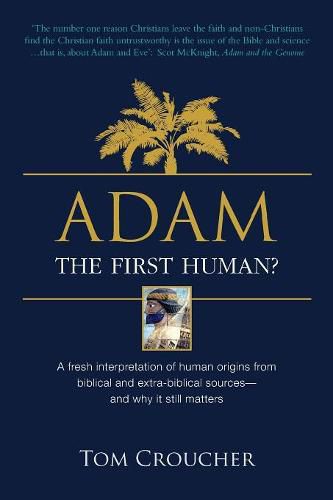Readings Newsletter
Become a Readings Member to make your shopping experience even easier.
Sign in or sign up for free!
You’re not far away from qualifying for FREE standard shipping within Australia
You’ve qualified for FREE standard shipping within Australia
The cart is loading…






This title is printed to order. This book may have been self-published. If so, we cannot guarantee the quality of the content. In the main most books will have gone through the editing process however some may not. We therefore suggest that you be aware of this before ordering this book. If in doubt check either the author or publisher’s details as we are unable to accept any returns unless they are faulty. Please contact us if you have any questions.
We all know the story: a couple (naked) in a beautiful garden, surrounded by peaceful animals and only themselves to please–an idyllic existence. Enter a talking snake, the offer of forbidden fruit–desire, capitulation, condemnation and then… expulsion from the garden. This is the well-known narrative.
But it has become more difficult to sustain the traditional view that Adam was the first human when confronted with the overwhelming evidence that modern humans began to appear in Africa about 200,000 years ago–and began migrating to the rest of the world 70,000 years ago. One of the major reasons for the decline in people adhering to the Christian faith is the churches’ failure to acknowledge and resolve this intellectual conflict.
In Adam: The first human? Tom Croucher applies a forensic-like focus to interpreting the first five chapters of the Bible. By careful, logical deduction and detailed, historical analysis, Adam is lifted out of the mists of pre-history and placed squarely within the context of a known period of human history–the early, literate period of Sumer in southern Mesopotamia.
Written for believers and sceptics alike, Adam: The first human? reads like a ‘whodunit’, unravelling the apparently contradictory evidence to reveal a consistent, plausible narrative that makes sense of all that we currently know, including the biblical narrative.
$9.00 standard shipping within Australia
FREE standard shipping within Australia for orders over $100.00
Express & International shipping calculated at checkout
Stock availability can be subject to change without notice. We recommend calling the shop or contacting our online team to check availability of low stock items. Please see our Shopping Online page for more details.
This title is printed to order. This book may have been self-published. If so, we cannot guarantee the quality of the content. In the main most books will have gone through the editing process however some may not. We therefore suggest that you be aware of this before ordering this book. If in doubt check either the author or publisher’s details as we are unable to accept any returns unless they are faulty. Please contact us if you have any questions.
We all know the story: a couple (naked) in a beautiful garden, surrounded by peaceful animals and only themselves to please–an idyllic existence. Enter a talking snake, the offer of forbidden fruit–desire, capitulation, condemnation and then… expulsion from the garden. This is the well-known narrative.
But it has become more difficult to sustain the traditional view that Adam was the first human when confronted with the overwhelming evidence that modern humans began to appear in Africa about 200,000 years ago–and began migrating to the rest of the world 70,000 years ago. One of the major reasons for the decline in people adhering to the Christian faith is the churches’ failure to acknowledge and resolve this intellectual conflict.
In Adam: The first human? Tom Croucher applies a forensic-like focus to interpreting the first five chapters of the Bible. By careful, logical deduction and detailed, historical analysis, Adam is lifted out of the mists of pre-history and placed squarely within the context of a known period of human history–the early, literate period of Sumer in southern Mesopotamia.
Written for believers and sceptics alike, Adam: The first human? reads like a ‘whodunit’, unravelling the apparently contradictory evidence to reveal a consistent, plausible narrative that makes sense of all that we currently know, including the biblical narrative.